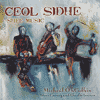
MİCHEÁL Ó hEIDHIN, CHARLIE LENNON, STEVE COONEY - Ceol Sidhe
Cló Iar-Chonnacht CICD186
I first met Mícheál Ó hEidhin at a Comhaltas weekend when he gave a talk on concert production. His suggestions still remain in my mind, even though it’s decades since I had a hand in concerts. At the end of the session, I asked him about the modes used in traditional Irish music. I’d long struggled to understand the structure; he explained them in less than a minute and made the whole thing seem so simple. That’s a measure of the man; that he could go to great lengths to expand on a subject yet simplify another so that it seemed obvious.
There’s no real reason for it but I’ve always thought of the concertina as a woman’s instrument. I’ve nothing against it, in fact I like it, but maybe I got the idea from PJ Conlon’s sister Rose Ann Murphy. She had a dislike for it that seemed strange at the time. Ó hEidhin’s playing is so sensitive yet spirited that I’d rather have him play the concertina than the piano accordion he was so well-known for. It’s certainly better-suited to slow airs; the piano accordion has too big a ‘voice’ for them.
In the introduction, Steve Cooney is described as ‘sure-footed’; that’s an understatement for sure. You’ll be aware of Cooney’s guitar but you’ll not be distracted by it. Charlie Lennon has been a pillar of traditional music for decades; his fiddle-playing here is as sure as ever. It’s good when friends swap tunes, even better when they swap their own tunes as they do with the two reels on track 6. The first is by Ó hEidhin, the second by Lennon. Of the 36 tunes, four are by Ó hEidhin and six by Lennon. And they’re not just something to prove their composing abilities; they’re well worth a place in the general repertoire. Rather surprisingly, reels are in the minority, outnumbered by jigs, hornpipes and flings as well as five slow airs.
I’m not a great fan of more than one instrument at a time playing slow airs; it usually means that different interpretations work against each other. There’s no problem here; Lennon and Cooney are so sensitive to the tunes that it’s almost like one instrument playing rather than three. Track 5, Limerick’s Lamentation, is a good illustration. It’s one I’ve been playing for years (along with just about everyone else). But I’d never have thought that this slow air can be played as a march, let alone a double jig too. It works well; if word gets out, these settings will give the tune a new lease of life. It’s a joyful feeling, like finding relatives you didn’t know you had.
The slow air, Easter Snow, was a great favourite of Séamus Ennis; so much so that he named his place in The Naul, North Co. Dublin, just that. There are many theories about the name of the air; even Ennis admitted to being unsure of its origin. Ó hEidhin has yet another, plausible reason; that it’s about a young woman, Esther Snowe, losing the man she loves. I well remember a Winifred Letts poem of the same name that my mother was very fond of, about a mother mourning the death of her only child. It has the opening stanza: “My jewel of the world, she sleeps so fast,/She will not hear you, Spring wind, if you blow;/So let you shake the blossoms of the thorn/Till her bed is hidden deep in Easter snow.” (Some people in Ireland still call fallen blackthorn blossom ‘Easter snow’.) Maybe Letts had the tune in mind when she wrote the poem; the air certainly has a poignancy that fits her words.
Na Géanna Fiáine [The Wild Geese] is another air that deserves to be played more often. Its strange how one particular phrase can snap your mind to attention. Ó hEidhin does a masterful job of portraying the wild longing of those exiles who left Ireland after the Williamite war.
The final track is a set of polkas, played in the distinctive fiery Kerry style. These are Ó hEidhin looking back to his time with the Brosna Céilí Band while taking his BMus at UCC. A mark of Ó hEidhin’s broad musical taste is the inclusion not just of flings and Strathspeys but of a slow air composed by Big Tom Anderson from Shetland. There aren’t many Shetland airs that I know of; this one is beautiful.
It’s a wonder to me why Ó hEidhin has waited so long to record his music. He gives a reason but it’s not a good one. People with his talent ought to make records; there are enough people with much less talent doing it. Just when you think that Clo Iar-Chonnacht can’t come up with yet another great CD, they release Ceol Sidhe. Let’s hope that isn’t a one-off; I could do with one like this every year.
Mick Furey
| Buy
this CD online from The Listening Post The Listening Post is the CD mailorder service of The Living Tradition magazine. This album was reviewed in Issue 90 of The Living Tradition magazine. |

